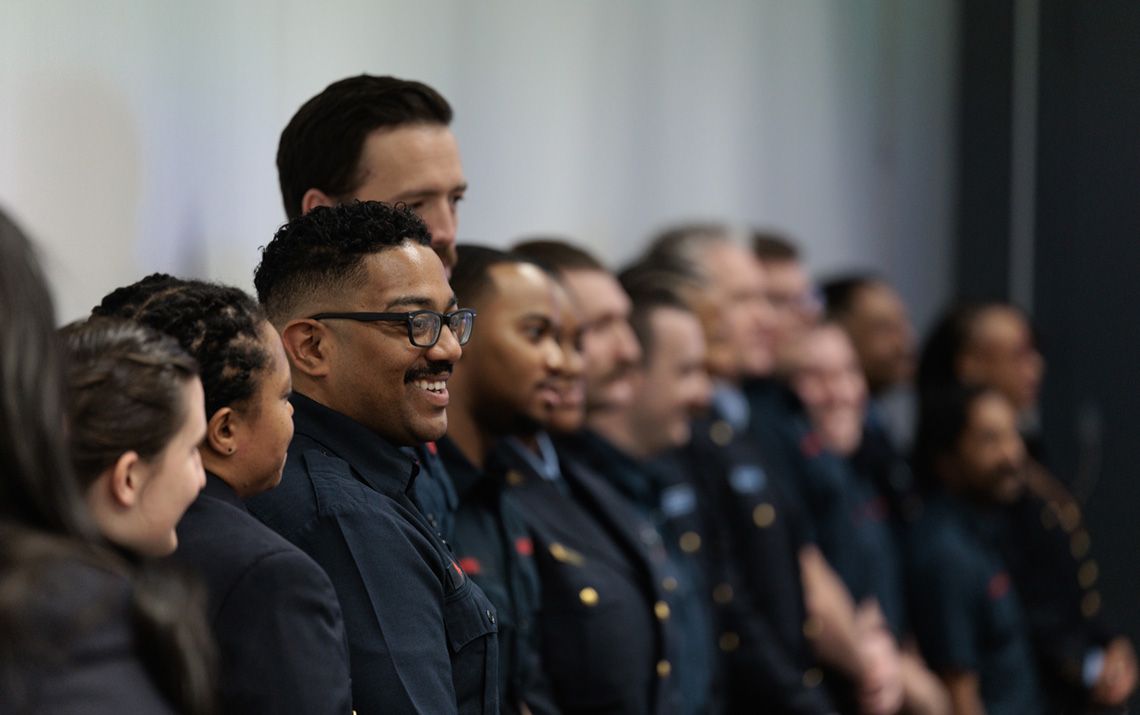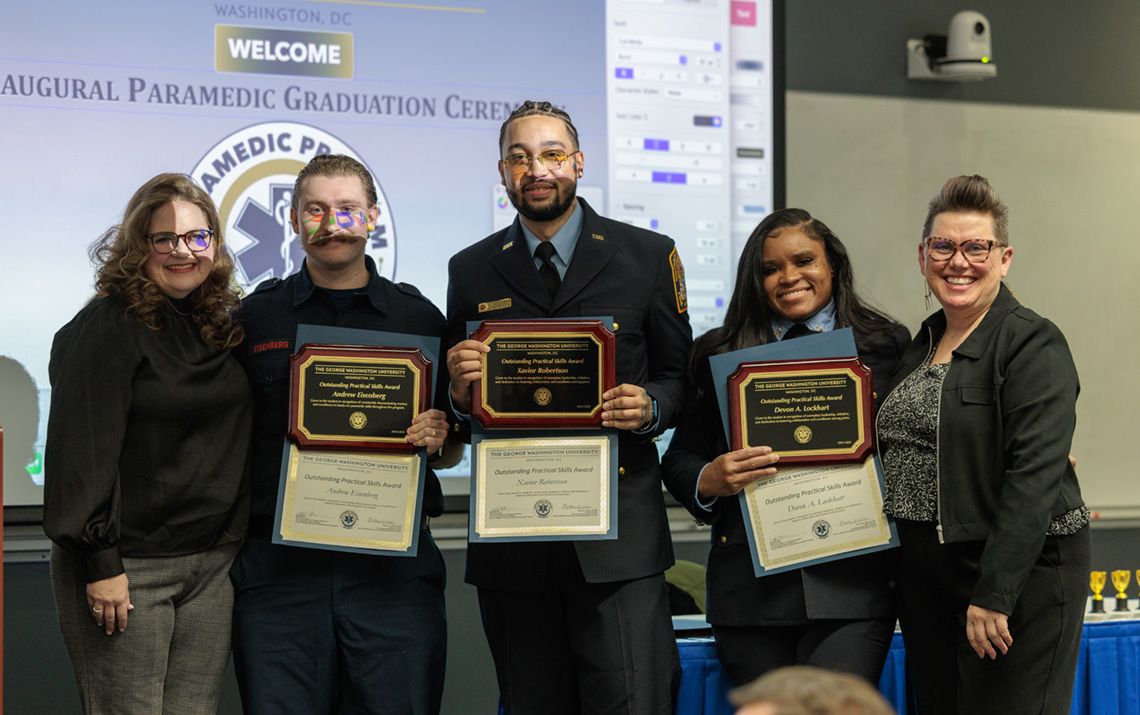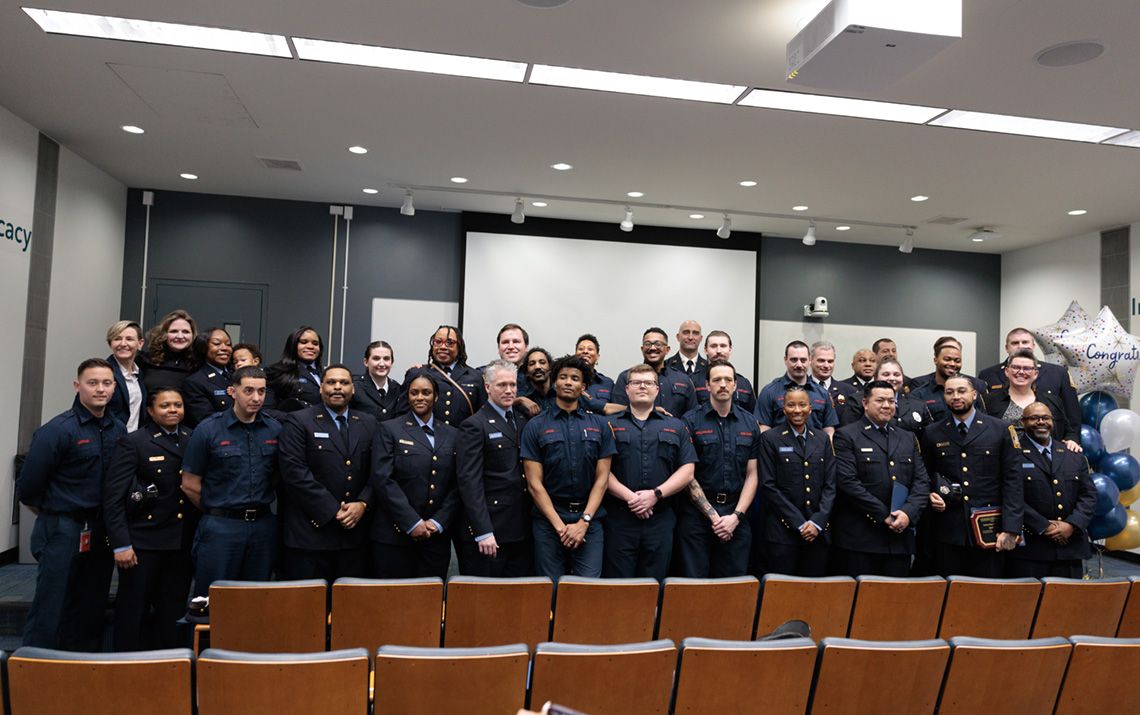Front-line emergency medicine in the Washington, D.C., region is set to take a major step forward, as a new generation of paramedics emerges to meet the growing demand for life-saving care.
Recently, 23 dedicated first responders from Washington, D.C., and Northern Virginia graduated from the inaugural cohort of the George Washington University School of Medicine and Health Sciences (SMHS) Paramedic Program.
The demand for qualified paramedics in the region has never been higher. To help answer the call, the SMHS partnered with local fire departments to create a year-long program featuring a 1,500-hour curriculum pairing classroom learning with hands-on clinical rotations.
“DC Fire and EMS, Arlington County Fire and Rescue and the City of Manassas Fire and Rescue all took this giant leap of faith with us,” said Program Director Gretchen E. Wills, NRP. “They joined forces with us; trusted me, Dr. [Kathleen] Ogle, and our wonderful teams, to build this incredible inaugural paramedic program from absolutely nothing and to make all of our educator dreams a reality.”
Upon completing the certificate program, graduates are eligible to sit for the national paramedic certification exam administered by the National Registry of Emergency Medical Technicians (EMTs). From there, they can earn a state certification and begin working as paramedics.
In her remarks, Kathleen Ogle, MD ’08, associate professor of emergency medicine and clinical research and leadership, and the program's medical director, spoke about her vision to redefine paramedic education in the D.C. region and cultivate clinicians with a strong foundation in critical thinking.
“Our program was created in response to an urgent need; a shortage of paramedics in local fire and EMS jurisdictions,” Ogle said. “Our success is measured by more than just graduation rates.”
The academy-style program, she added, emphasizes the development of clinicians who are prepared to deliver care grounded in critical thinking, evidence-based practices and a deep understanding of medical principles.
The leap from EMT to paramedic is significant, requiring a broader skill set and deeper knowledge of medications and patient conditions, said Devon Lockhart, a member of DC Fire and EMS and a member of the inaugural cohort of graduates. “Being a paramedic is a greater responsibility. It demands much more critical thinking.”
While EMTs provide basic life support — CPR, bandaging and administering oxygen — paramedics, explained Derek Andresen, clinical assistant professor of emergency medicine, deliver the highest level of pre-hospital care.
“Paramedics,” he said, “can perform surgical procedures, administer medications, and conduct physician-level skills like intubation, IV therapy, EKG monitoring and more. They operate autonomously, outside of hospitals, acting as an extension of physicians in the pre-hospital setting.”
DC Fire and EMS Chief John Donnelly Sr. told the graduates and families assembled in Ross Hall at the celebration event on Jan. 24 that “it’s a big day, but it's only the beginning of your journey.”
“I'd like you to remember what it feels like today, because you will face being tired, you will face stress,” he said. “When you feel like that, I want you to think back to right now and say, ‘I'm so proud to get out there and help people, those people who need your help the most.’”
He also emphasized that DC Fire and EMS is the third-largest health care provider in the District of Columbia. “You are more than paramedics — your work impacts health care access for the people we serve. You are now a vital part of that system, at a higher level.”
Arlington County Fire Department Chief David Povlitz highlighted the importance of expanding the pool of paramedics in the region. “We need you in our systems, we need you in our departments. Most importantly, you’ve signed up to provide emergency medical care to citizens, residents and visitors — delivering some of the most cutting-edge care possible.”
For Lockhart, the return of GW’s paramedic program was a perfect opportunity, especially with limited local options for further training. “It just happened to come at the right time,” she said.
Heading back into the classroom was an adjustment, but with supportive instructors, Lockhart found the transition manageable. “I felt like I received a high-quality education,” she said. “Dr. Ogle and Gretchen were always supportive, open to answering questions, and even helped set up study sessions.”





